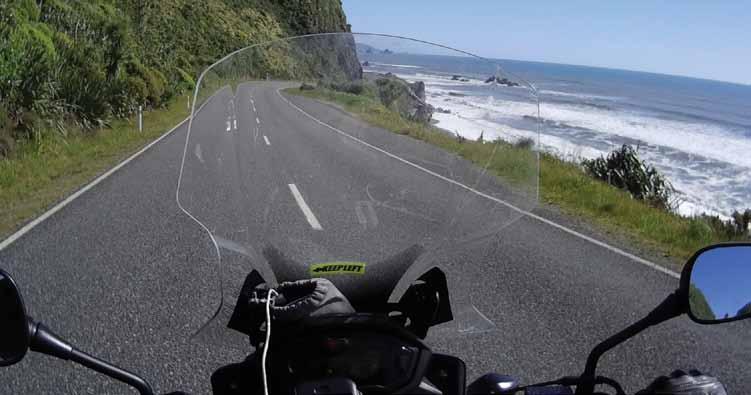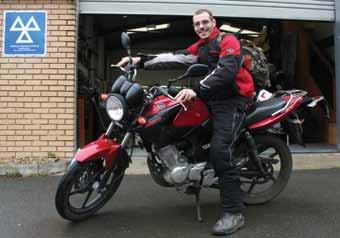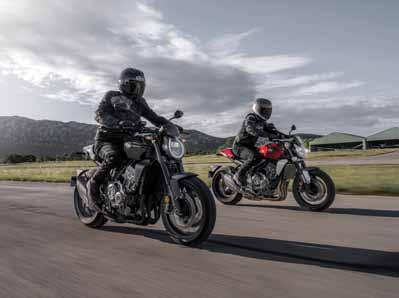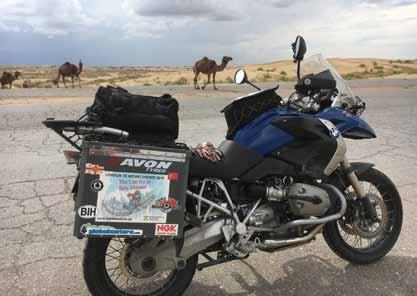
9 minute read
BMF News
News
NMC HITS THE GROUND RUNNING
Advertisement
The National Motorcyclists Council (NMC), which was launched on 5th March, has already started work. “The period since the launch has seen early impact and more political gains than expected,” said spokesman Craig Carey-Clinch. “Government officials themselves initiated early contact, which has had the effect of establishing the NMC as a consultative body.”
The NMC is a joint venture between the BMF, MAG, the TRF, IAM and the ACU, to present a single voice for motorcycling to government. “Parliament has also offered support to the NMC,” added Craig Carey-Clinch. “MPs and Peers attended the launch and have been very positive since. We’ve also been well received by the All Party Parliamentary Motorcycle Group (APMG), which has agreed to support a number of activities in Parliament on behalf of the NMC.”
Initial meetings have centred on the group’s call for a new Government Motorcycling Strategy, and government officials are said to have reacted positively to the idea. This would include: • Motorcycle access to bus lanes • Access to ULEZ/LEZ areas • Easing licence barriers for new riders • Driver education about PTWs • Protecting the use of older machines, on and off-road • Being part of the debate on future transport/ decarbonisation
Outside Westminster, the NMC organised hustings for the London mayoral election, giving riders based in London and the south east the chance to quiz candidates or senior party figures. The Green Party and Animal Welfare Party were keen to engage ‘sustainable motorcycling’ within the transport policy debate, while both the Lib Dem and Conservative speakers spoke positively about motorcycling’s role in the capital.
Meanwhile, the NMC responded to the DfT’s Future Transport Rural Strategy consultation, pointing out that motorcycles and scooters can play an important role in rural areas where walking and cycling is less of an option, but where lower wages make the lower running costs of a small machine more affordable than a car. The role of motorcycles as transport was not considered in the consultation and yet schemes such as Wheels 2 Work can address specific issues such as longer distances and lack of public transport.

NMC wants to get more bums on seats
GOOD START
“The NMC’s foundation has been welcomed,” said Craig CareyClinch, “sometimes strongly so, and it seems clear that key audiences also welcome the ‘combined voice’ approach on those shared issues we have identified. This is particularly apparent in dealings with Government and Parliament thus far. This is not the first time that motorcycling organisations have worked together, and the NMC has sent out a powerful message of unity on motorcycling issues.” www.uknmc.org

Brexit could disrupt fly/ride holidays

HOLIDAY DISRUPTION?
A loophole in the Brexit agreement between Britain and the EU could disrupt motorcycle holidays abroad. It could affect an increasingly popular form of biking holiday – shipping the bike to a sunny destination while the owner flies out to meet it. Several motorcycle travel and adventure businesses use this system and large numbers of bikes are shipped out in this way each year, before being shipped home again after the end of the holiday.
There is nothing in the UK’s trade deal with the EU which covers this practice, leaving no option but to resort to international norms, which vary widely, with no established procedure for the channel ports as yet. The National Motorcyclists Council has been asked to look into this issue and has made contact with government and other interested parties to the problem. The NMC is reportedly working on a solution for when borders reopen for tourism. Bike shipping for competition, and events where the bike isn’t road registered, are unaffected, as these are already catered for under ATA Carnets, available via the ACU. Photo: Richard Barr
ULL LICENCE ELECTRICS REFUSED – PIC
FULL LICENCE ELECTRICS REFUSED
Motorcyclists are being refused the opportunity to take their full A licence test on an electric motorcycle. The DVSA list of approved machines on which to take A1, A2 and A licence does include some Zero electrics which are approved for the A1 and A2 tests, but not the unrestricted A category. The full list is at www. gov.uk/motorcycle-test/motorcycles-mopeds-you-can-use
BMF member Ryan Duffy discovered this when he decided to apply for his test. Twenty-eight-year-old Ryan, who lives in Redditch, has already passed his CBT on an electric bike and is keen to obtain a full licence. “I have no desire to ride a petrol bike,” he told the BMF, “and I can’t understand why I’m unable to take my test on an electric. I know that if I did I would only be eligible to ride an automatic bike, but that doesn’t bother me, because I only want to ride electric.”
The DVSA criteria for A-class test machines specifies power of at least 50Kw and weight of at least 175kg. Several electric motorcycles meet both of these criteria, notably the Zero SR/F and SR/S, the Harley-Davidson Livewire and the Italian-made Energica. However, while petrol motorcycles are measured on peak power, electrics are measured on their continuous power rating, which is a lower figure – on that loophole, none of these bikes qualify, despite their real-world performance being similar to that of a 750cc petrol machine.
We asked Mark Winn, Chief Driving Examiner at the DVSA to comment: MCR: Why are the Energica range and Zero SR/F and SR/S not eligible for an A licence test? Mark Winn: “All motorcycles used for test have to ride, perform and behave in the same way as most vehicles typically in that category. The electric motorcycles in the Energica range and Zero SR/F and SR/S models are classed as A2 vehicles due to the amount of useable power they produce and can sustain over a 30 minute period. If they were to produce more continuous power they could be used for the full category A test.” MCR: Why use peak power as the criteria for petrol motorcycles and continuous power for electrics? Mark Winn: “With electric motorcycles as the battery power drops, so does the power of the machine. Petrol engines do not suffer with this power depreciation on an average journey. This is why, for licensing and testing purposes, the power rating of electric motorcycles is decided by their continuous power and not their peak power. This means they have to be able to maintain their normal power performance over a 30 minute period, not just for a shorter time.” MCR: How does this fit in with the broader Government policy to encourage a transition to electric vehicles? Mark Winn: “The development of electric vehicles is something that DVSA has monitored and is keen to see grow. As such, we’ve made sure electric motorcycles can be used for the motorcycle
You can take your test on a big petrol bike...... but not on a Zero sR/s
test, providing they meet the same rules all vehicles in that category have to comply with.”
Scott Edy, Business Development Manager of charging infrastructure company Virta has lobbied the Department for Transport on this issue. “It’s a crazy situation,” he told MCR, “and something that has generally been overlooked by everyone. I approached Grant Shapps and was referred to the DVLA, who passed me on to the office of Baroness Vere, which sent me back to the DVLA. They still didn’t get it.”
NEW APMG CHAIR
Parliament’s All Party Motorcycle Group (APMG) has a new chair in Bill Wiggin MP, who is a strong advocate for motorcycling and in 2000 tabled an amendment to allow motorcycles into bus lanes. The APMG brings pro-motorcycling MPs and Peers from all political parties together to discuss and promote PTWs – it’s a well established part of the Westminster world, alongside other all-party groups. Former chair Chris Law MP becomes a vice chair, as does Fabian Hamilton MP, Ian Paisley MP and Lord Fairfax, representing the Conservatives, Labour, SNP and DUP.
MORE CLEAN AIR ZONES COMING
At least 12 UK cities and large towns are planning to introduce Clean Air Zones (CAZ) either this year or in 2022. This follows the launch of a CAZ in Bath in March 2021, and in Birmingham on 1st June. Aimed at reducing urban pollution, CAZ areas charge petrol and diesel vehicles for entering the zone. Oxford launches its Zero Emission Zone trial in August, while the London ULEZ is expanding out to the North and South Circulars in October. Bristol is aiming to start its CAZ the same month, while Bradford, Portsmouth, Newcastle, Gateshead and North Tyneside should follow later in the year. In 2022, we should see Aberdeen, Dundee, Edinburgh and Glasgow open CAZs between February and May, followed by Greater Manchester and Liverpool. The precise rules vary – motorcycles are exempt in some zones, such as the Birmingham scheme, while in London exemption applies to classic bikes (more than 40 years old) or those meeting or bettering Euro 3 emissions limits. To check whether you need to pay, go to www.gov.uk/clean-air-zones for Bath and Birmingham, and tfl.gov.uk/modes/driving/check-your-vehicle for London. The BVRLA (British Vehicle Rental & Leasing Association) has a useful guide to CAZs - www.cleanairzones.co.uk
ARE HELMET CAMS LEGAL?
Vehicle mounted cameras – whether dash cams in cars or helmet/bodywork-mounted cams on bikes – are not legal in all EU countries. Ian Dobie, BMF member and President of The BMW Club, has done some research on their legality and came up with some surprising results.
“The UK has a very relaxed view of in-vehicle recording equipment,” said Ian, “which has proved very worthwhile, providing vital evidence in some court cases. But things are different in the EU, where there is not a single common policy governing their use – some countries put stringent conditions on their use and some won’t allow it under any circumstances.” Ian’s research came up with the laws pertaining to dash cams in cars and vans, and it is highly likely they would apply to bike and helmet-mounted cameras as well.
Legal In...
Italy, Denmark, Spain, the Netherlands, Sweden, Malta, Serbia and Bosnia Herzegovina.
Illegal In...
Austria has a complete ban on ownership as well as use, as does Portugal. In Luxembourg you can own a cam, but can’t use it.
Legal, with Conditions
Belgium, France, Germany, Norway and Switzerland. “Whilst nothing is said about helmet-mounted cameras,” added Ian, “you need to consider taking precautions. Depending on the type of camera fitted it may simply be a case of removing it and putting it in your luggage. Discreetly mounted cameras such as the Innov K2 might be a lot more difficult to simply remove. Switching off the record mode is the next obvious solution, but may not be sufficient in countries where ownership and fitment is illegal. Whilst (cameras) have proved invaluable to many UK road users involved in road traffic collisions, unfortunately it appears that some European Countries don’t share the same rationality. The EU has no common policy, so frankly it is not worth the effort or risk.”
BMF NEW WEBSITE LIvE
Our new website – www.britishmotorcyclists.co.uk – is
now live. You’ll find all the same features as before – news, clubs section, consumer information and of course the BMF shop – but with a fresher look and snappier design.










